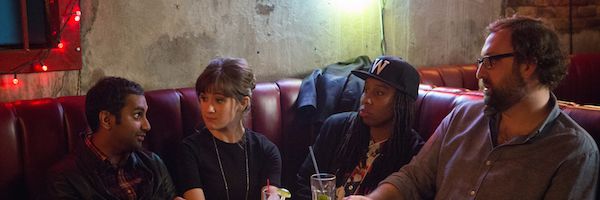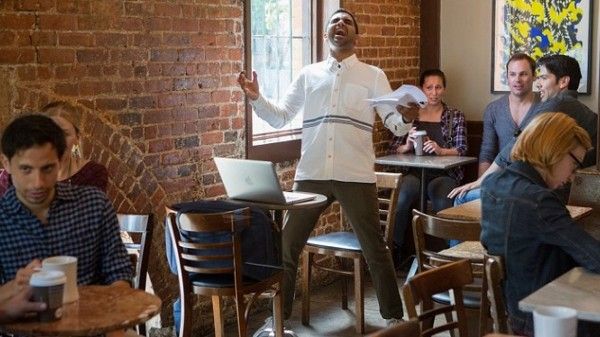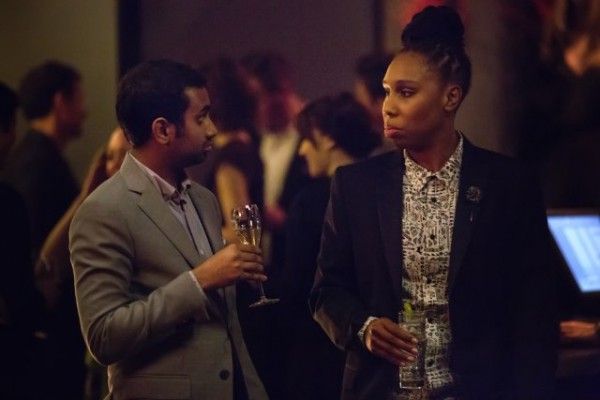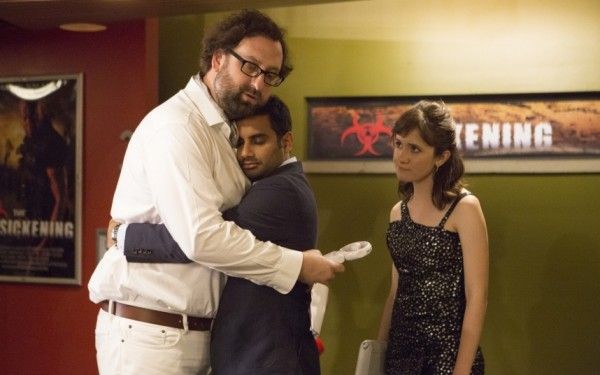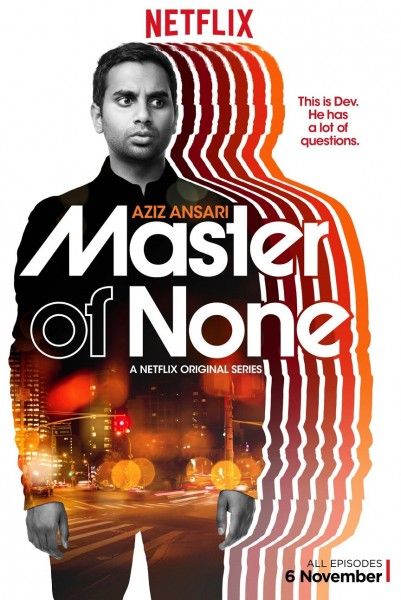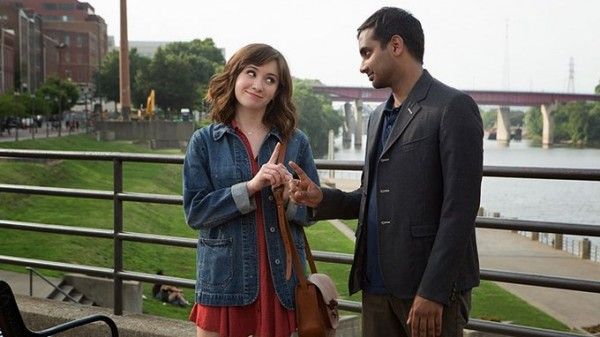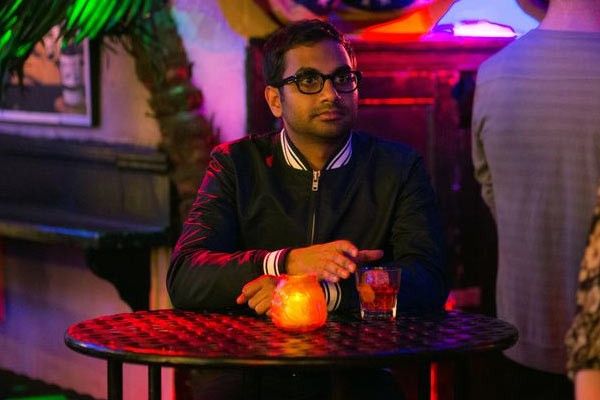[Editor’s Note: Welcome to “Stream This,” our weekly feature where we single out television programs and movies of considerable merit that are available on Netflix, Hulu, Amazon, Crackle, or other streaming services. Look for a new Stream This recommendation every week.]
In a way, the first scene of Aziz Ansari's brilliant new comedy series, Master of None, is the most telling of what the South Carolina-born performer is after in his new Netflix show. While having sex with Rachel (Noël Wells), Dev (Ansari) suddenly announces that his condom has broken and rather than just shrug it off, they decide to stop and check Google to see if pre-cum can lead to pregnancy; soon after, they run to a pharmacy for Plan B, and he diverts from the awkward matter at hand to talk about apple juice. Responsibility, it would seem, doesn't necessarily equal maturity, and conflictive, fascinating ideas like this power Ansari's view of "Millenials" in New York City, and dating in the digital age.
At heart, Ansari's character is yet another commitment-phobe, in a similar but by no means identical vein as Jerry Seinfeld in Seinfeld. But unlike most films and shows that investigate such views on relationships, distrust of commitment in Master of None is not portrayed as a philosophy but rather as a feeling, a matter of emotional security. In the first episode, entitled "Plan B," Dev considers both sides of the commitment fence, with his towering, free-spirited friend Arnold (Eric Wareheim, who directs a handful of episodes as well) representing a life devoid of romantic commitment as they hang out with their married friends, many of whom are also parents. Dev envisions himself as a great parent when he speaks with his friend about fatherhood, and the show makes good use of cutaways to fantasies and past events alike, sprinkling this strikingly honest depiction with flutters of extravagant supposition and history. This is just as true when Dev realizes that parenthood without due consideration has led his friend and his wife to divorce, and a drinking problem that the show subtly hints at. There is no sure answer for our protagonist, no easy wisdom to grasp at or grapple with, and the series largely shuns anything even remotely akin to definitiveness when it comes to human interaction, romance, or sex.
This is a view of romantic relationships as similarly rich and ponderous as Nick Stoller's sensational The Five-Year Engagement, one of the best comedies of this decade, but it's not just dating that Ansari and co-creator Alan Yang are considering here. In "Parents," Dev and his best friend, Brian (Kelvin Yu) take their parents out for a dinner, in the hopes of learning more about their lives and actually expressing gratitude for the comparatively easy life they were handed. Dev's parents are played by Ansari's own mother and father, Fatima and Shoukath, and there's a personal warmth to their interactions that goes beyond mere sentimentality, especially as Dev navigates how to be at once appreciative of where he comes from, and yet not beholden to the traditionalism that his parents were forced to buy into. And like Ansari's previous gig, Parks and Recreatiob -- the brainchild of Master of None producer Michael Schur -- the scope of the struggle between tradition and modernity is not limited to Dev, but can also be seen in how Brian comes to see his father's journey from a young boy forced to kill his pet to a small-scale restaurant owner and manager in America.
Brian is only one of three best friends that Dev spends his time with throughout the series, and the group of five-borough locals represents a broad, if just a bit obvious spectrum of perspectives. This would include Wareheim's gigantic white baby-man and Denise, a successful African-American lesbian, (played by the hugely talented Lena Waithe in a breakout performance); Ansari and his writers make their social maneuvers, philosophies, and personal histories just as important as Dev's. At one point, Denise explains to Dev how she knows a straight co-worker is interested in her and how she plans to seduce her, which is not only a wise bit of observational humor but also touches on the show's view that both sexuality and romance are fluid. Not for nothing does Dev cuckold a titan of industry (Noah Emmerich) later that night with his food-critic wife (Claire Danes), an act that, months later ends up having far more positive effects on Danes' character's relationship with her husband than you might imagine.
As such, the show is distinctly aware and considerate of time and its erratic whims, and how relationships are essentially at the mercy of such things. Though we meet Wells' character in the first episode, she doesn't reveal herself to be a fully fleshed-out character (and, eventually, Dev's girlfriend) until later in the series, as an off-screen ex-boyfriend and general hesitation prove to be hurdles to her honest and sweet romance. And once they are together, the show doesn't lean on a single cliche to depict the fights and personal issues that plague all relationships. In "Ladies and Gentleman," Dev defends a male director that Rachel says ignored Denise and her while greeting Arnold and Dev, and it takes Dev awhile to own up to his wrongness in the situation, largely because he's so certain of his perspective of a feminist.
Just because a man thinks that women are due equality on all levels, its easy to forget the minutiae of sexism, the little parts that allow it to continuously glom onto every corner of society. Even more tough to accept is that being equal often means having to suffer professional loses, such as when Dev's feminist perspective ends up costing him a nice commercial gig. The series suggests that taking these sort of punches, owning up to unknown flaws, not only makes you a more thoughtful person, but makes for a stronger relationship with your partner.
Dev's relationship with Rachel is a major facet of Master of None, but Ansari is just as interested in race as he is in the ebb and flow of modern romance. In "Indians on TV," Dev confronts the startling, borderline surreal reality of being anything but white on television, having to suffer through critiques about his accent, fears of having more than one Indian character on a TV show, and a history of brown-face in all media; the episode opens brilliantly with a supercut of popular Indian cliches and characters in film and TV. Later on, Dev is wine-and-dined over a racist e-mail, and confronts the executive responsible for the correspondence, but even here, the series doesn't harp on the offense of such things, rather takes the time to start an open discussion about such acts, even touching on how such encounters can benefit a young actor.
Race, like age, sex, communication, culture, and behavior, is a major element of life in Master of None, but it's not what defines Dev's life or his relationships with others. As such, Ansari's show is socially responsible and personally expressive in ways that don't presume importance, and the series never insists that racism, sexism, violence, or any other ills of society are the predominant elements of a well-lived life. Rather, they exist at the same time as the irrepressible joys, thrills, professional highs, and personal lows of life, much like how Master of None is at once one of the greatest comedy series to debut on streaming and TV ever, the most progressively thoughtful, challenging, and inventively directed show Netflix has produced thus far, and a brutal rebuff to the argument that a show can't appeal to the masses while also fully embracing diversity.
Master of None is currently available for streaming on Netflix.

